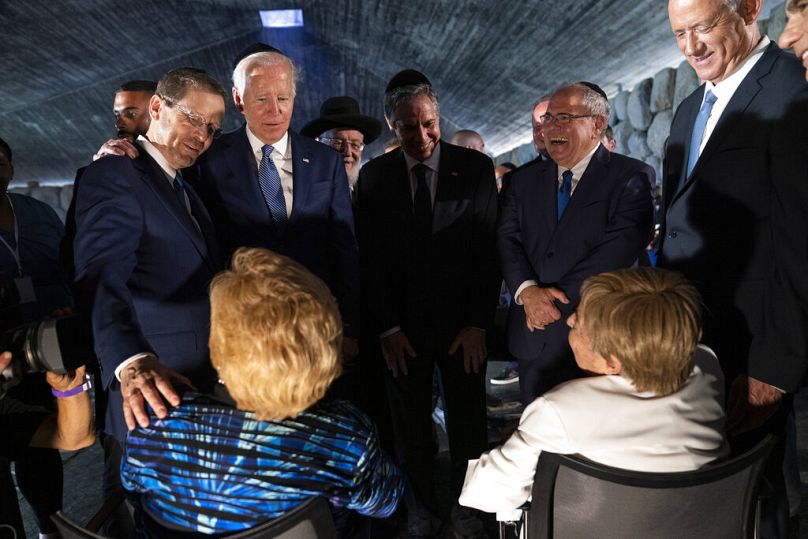The US president wlll meet with Palestinian officials on Friday, and continue to Saudi Arabia on his first Middle East tour since taking office.
Joe Biden opened his first visit to the Mideast as president on Wednesday by declaring a “bone deep” bond between the United States and Israel, and pledging to strengthen economic connections between the two countries going forward.
There was no mention yet however of one of the bigger goals of his visit to the region, assuring both Israel and Saudi Arabia that he is committed to preventing Iran developing nuclear weapons.
“We have a full agenda over the next few days, because the relationship between Israel and the United States covers every issue that matters to our mutual future,” said Biden, who was making his 10th visit to Israel. “We are united in our shared values and our shared vision.”
Israeli officials said Iran's quickly evolving nuclear program is at the top of their agenda for talks with the US president. Biden made reviving the Iran nuclear deal, brokered by Barack Obama in 2015 and abandoned by Donald Trump in 2018, a key priority as he entered office.
But indirect talks for the US to reenter the deal have stalled as Iran has made rapid gains in developing its nuclear program. That's left the Biden administration increasingly pessimistic about resurrecting the deal, which placed significant restrictions on Iran’s nuclear program in exchange for sanctions relief.
COVID concerns as Biden visits Holocaust memorial
Due to concerns about a rise in COVID-19 cases, White House officials said President Biden would try to limit physical contact during the trip.
At the arrival ceremony, Biden mostly skipped handshakes and instead offered fist bumps to Israeli officials. However he made an exception by sharing a hearty handshake with opposition leader Benjamin Netanyahu.
The president received a briefing on Israel's “Iron Dome” and new “Iron Beam” missile defence systems and visited the Yad Vashem memorial to Holocaust victims.
Biden, wearing a skullcap, was invited to rekindle the eternal flame in the memorial's Hall of Remembrance. Two Marines placed a wreath on the stone crypt containing the ashes of Holocaust victims. Biden bent down to adjust it and placed his hand over his heart as the Marines saluted for a moment of silence.
Biden listened in silence as a cantor recited the remembrance prayer, before he greeted two Holocaust survivors, kissing the women on their cheeks. He had tears in his eyes as he engaged them in conversation.
“My mother would say ’God love you, dear,'” Biden told the women.
One of the survivors, Rena Quint, 86, later said she told Biden how her mother and brothers were killed in a death camp. Quint, who was born in Poland, said she was reunited with her father in a male slave labour factory, where she pretended to be a boy. Her father also was murdered.
“Did you see the president hug me?” she asked “He asked permission to kiss me and he kept on holding my hand and we were told not to touch him.”
Quint arrived in the United States in 1946 and was adopted by a childless Jewish couple.
Biden meets with Palestinian officials on Friday
The US president is spending two days in Jerusalem for talks with Israeli leaders before meeting Palestinian President Mahmoud Abbas on Friday in the West Bank.
Biden said he will emphasise in talks with Israel and Palestinian leaders his continued support for a two-state solution to the Israeli-Palestinian conflict. But he acknowledged that it likely wouldn't be feasible “in the near term.”
Biden added that a two state-solution is the best way to ensure a “future of equal measure of freedom, prosperity and democracy for Israelis and Palestinians alike.” Biden's national security adviser, Jake Sullivan, said that Biden would not offer any proposals during the trip aimed at restarting talks.
In a Washington Post op-ed published Saturday, Biden criticised his predecessor in the White House, Donald Trump, for quitting the nuclear deal that Britain, France, Germany, Russia, China and the European Union also signed onto. But Biden also suggested that he's still holding onto at least a sliver of hope that the Iranians will come back into compliance.
“My administration will continue to increase diplomatic and economic pressure until Iran is ready to return to compliance with the 2015 nuclear deal, as I remain prepared to do,” he wrote.
Israeli officials, who briefed reporters before Biden arrived in Israel, said the US and Israel would issue a broad-ranging “Jerusalem Declaration” on Thursday that will take a tough stance on Iran’s nuclear programme.
The declaration commits both countries to use “all elements of their national power against the Iranian nuclear threat,” according to an Israeli official who spoke on the condition of anonymity to preview the statement.












